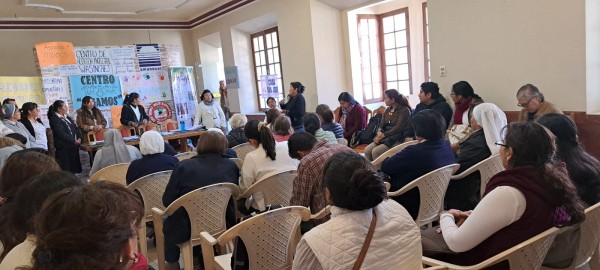
Can you imagine the value of a hug for an abandoned child? Or the hope in the eyes of a teenager who has suffered so much and is beginning to dream of a brighter future for himself? Or the simple security of a hot meal for a child who has nowhere else to eat? Well, that is the reality of Casa San José, a home run by the Community of Saint Paul, and of other 72 foster homes here in Cochabamba, Bolivia. Every day we open our doors and our hearts to the most vulnerable, giving them a ray of hope in the midst of adversity.
At Casa San José, each year we provide that hope to approximately 115 children and adolescents who are at risk of homelessness, offering them the opportunity to rebuild their lives and return to the warmth of a family. Your generosity has been a beacon on this journey, allowing us to offer them not only a roof and a livelihood, but also the possibility of dreaming of a different tomorrow. Thank you so much for your constant support, which is vital to our task!
However, a bureaucratic shadow threatens this essential work, as well as that of 72 other homes that together serve nearly 4,500 children and adolescents in the region. Incomprehensibly, the Autonomous Municipal Government of Cochabamba, instead of being an ally in the protection of vulnerable children—a responsibility conferred upon them by law—is imposing obstacles that seriously jeopardize our own sustainability. This situation affects various religious and secular institutions that manage these shelters.
Recently, the governor's office imposed the Departmental Law 1006, a regulation that, without consulting us or recognizing our altruistic dedication, unfairly equates us with for-profit companies. The direct result: costly and unnecessary procedures that undermine our autonomy and compromise the vital care we provide to the children who need it most.
We are not asking for privileges, but for justice and recognition for the work we do, fulfilling a responsibility of the State. We cannot allow our work to be hindered, jeopardizing the well-being of the children who depend on us for their protection and development. The imposition of this law could force us to make drastic decisions, including closing our doors, leaving hundreds of children and adolescents without shelter —who now find a safe and hopeful refuge in Casa San José and other foster homes.
Faced with this critical situation, we ask ourselves with deep concern: where will the children go if we cannot continue to offer them a future? At Casa San José and the other foster homes, we are standing up to fight for the repeal of this unjust law. We want to keep you informed about this crucial battle we are waging for the future of the most vulnerable. In this arduous struggle for the continuity of our work and the well-being of the children, the various organizations that manage the 73 homes have joined forces to express our deep concern to the authorities and the public. We sincerely hope that our voices will be heard and that we can establish a constructive dialogue that will allow us to reach a fair and reasonable consensus to continue helping thousands of vulnerable children. Thank you for always being by our side!
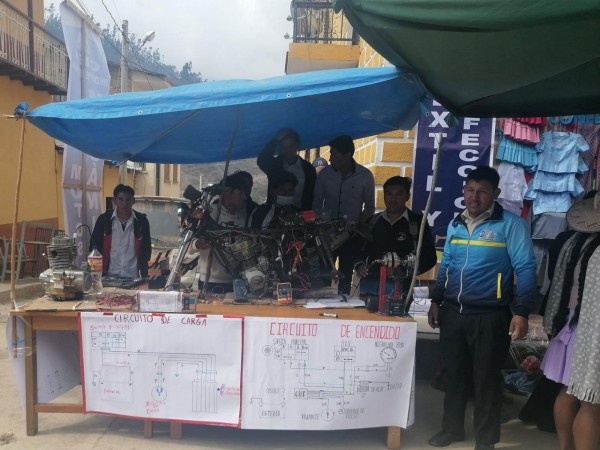
Six years ago, the Community of San Pablo in Bolivia decided to promote technical training for young people and adults in the Independencia region (Cochabamba), opening a training center in the village of Totorani. As a result, this is the second year that the Bolivian Ministry of Education has recognized the three technical careers (motorcycle mechanics, textile manufacturing and handicraft weaving) taught at the Totorani Technology in Independencia, where students graduate with a nationally recognized degree (basic, auxiliary or intermediate degree).
On October 12, the 53 students enrolled in the three technical careers participated with great satisfaction and pride in the 1st Humanistic Technical Baccalaureate Productive Fair, showing the products that they have learned to make during this course. The fair took place in the town of Independencia, where all the Andean municipalities of the department of Cochabamba participated. That day, each Technological Institute presented the technical-scientific achievements developed in each center. The three Totorani Technician courses were very well received, with the motorcycle mechanics course standing out, as it is the only such formation opportunity that exists in the entire department of Cochabamba.
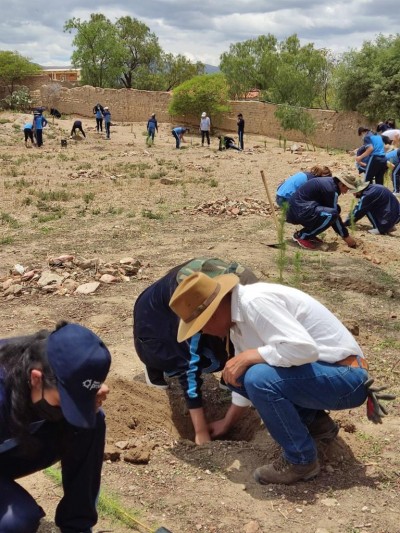
A few days ago, 68 young Bolivians aged 17 and 18 participated in a talk about climate change and the importance of planting trees, as well as caring for the environment. The "Amor de Dios" school in Cochabamba, run by the Sisters of the Love of God, invited Aniceto Arroyo (an agronomist who is also an associate member of the Community of Saint Paul) to explain the importance of maintaining the balance of the environment to sustain life on earth as we know it. He also took the opportunity to emphasize the words of Pope Francis on the subject: we should never forget that the environment is everyone’s responsibility and that it is a collective good.
After the conference, all the participants went to the Franciscan convent of San José de Tarata (located one hour from the city of Cochabamba), where the young people, together with seven teachers, two sisters and the agronomist, planted 200 pines produced in the tree nursery that the Community of Saint Paul has in Totora Pampa (Municipality of Vacas) for the reforestation of the area.
It was a beautiful experience to be able to work with the Sisters of the Love of God and thus join forces to share achievements and concerns. Hopefully in the future we can continue to promote awareness of the importance of the climate crisis that we are experiencing among young people in Bolivia.
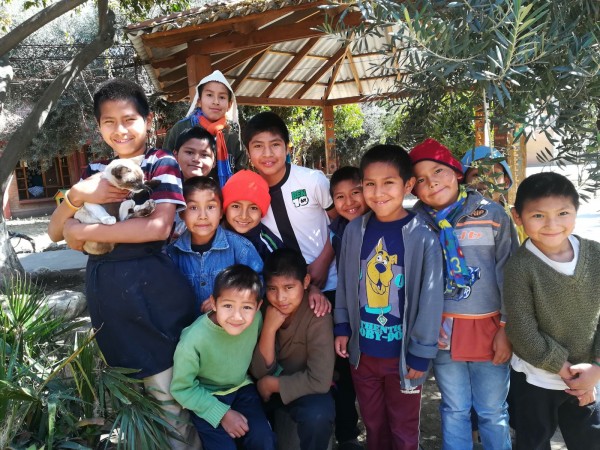
From Casa San José, in Cochabamba, we receive the story from one of the street boys who are sheltered there.
«My name is Andrés, I am 13 years old, and I live in the city of Cochabamba. Today I thought it would be a good day to tell you something that happened to me:
In one of my many trips to school, I met two children, who were brothers: Lionel, 11, and Daniel, 6. I met them there on the streets of oblivion and nostalgia, busy and noisy streets. They asked passers-by and vehicles for money, regardless of the danger they were in, although I think it was fun for them, and they did not think it was dangerous. I was carrying some food, so I stopped to rest and eat my little snack. At that moment we exchanged a few words and struck up a friendship. We spoke. They told me that their mother abandoned them, and their father did not take care of them; they were always hungry, and affection was always lacking. They spoke with great sadness and regret. So they had decided to go out into the streets to juggle and ask for money so they could buy food for themselves and their younger sisters.
That first meeting was followed by others, and with time I had many opportunities to share a little snack with them and talk about our things. But one day, I didn't find them anymore. It was as if they had disappeared.
However, my luck also changed. One afternoon after wandering the streets aimlessly, the police caught me and took me to a home called Casa San José. I did not want to go there, because I liked life on the streets, and that place was strange and unknown to me. My big surprise when I entered was to see several children playing in the yard, but what caught my attention were two boys in particular. The two who were not strangers to me. There were Lionel and his brother Daniel! I imagined they were as lucky as me and the police found them alone on the street. After bathing and putting on clean clothes, I ran to give them a big hug. And we spent the afternoon talking and telling each other about our adventures.
Lionel told me that his sisters were living in another center, although the youngest, five years old, became very ill and died of leukemia.
After a few months living in Casa San José with several children, having fun and being content and happy, Lionel told me that his father was going to come with his sisters to go all together to live at his house, the four of them. I was sad, since they would be leaving, but I was happy for them when I saw how their father hugged them. This was a hug expected by Lionel and Daniel. That day many emotions came out, so they all ended up crying.
I also missed my family. I miss them a lot. I hope that there will soon be a reunion with them, like that of Lionel and Daniel with their dad. You will ask me why I ran away, if I love my family, but this is already part of another story. My story, that perhaps one day I will tell you».
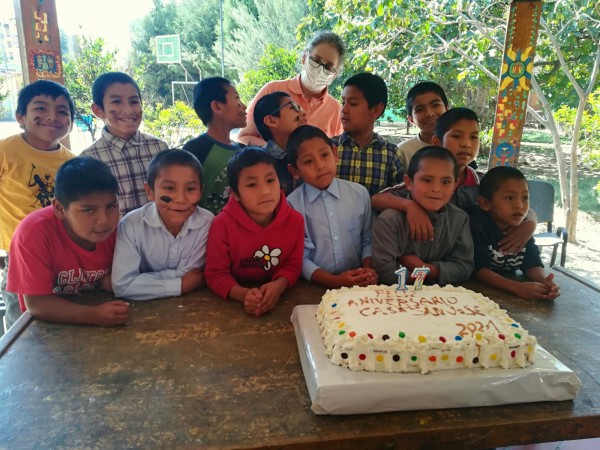
On May 1st, the team and all the children and teenagers of “Casa San José” celebrated the 17th anniversary of our home for street children. We are very proud of these seventeen years serving the most vulnerable population, seeking every day that the children and adolescents welcomed in our home regain the right to live in a family.
In all these years we have contacted more than 5,500 children on the streets of Cochabamba, and we have cared for more than 2,200 boys at our home. More than 1,100 returned to their homes and a significant number were transferred to other institutions. The Government of Bolivia, in this year 2021, has given us a recognition that reads as follows: “For their outstanding work in favor and ensuring the comprehensive development of children and adolescents in vulnerable situations, providing support, shelter, food, care and above all respect for the rights and dignity of people, for their vocation of service and contribution to human development in the department of Cochabamba, Bolivia, with an invaluable value.” This recognition honors us, but much so the memory of each one of the children, dear children of God, whom we have met. It fills us with joy and pride to have shared and made a change in many of their lives, helping them to return to their families or to join other educational institutions. Working with all of them has paid off, and we keep moving forward!
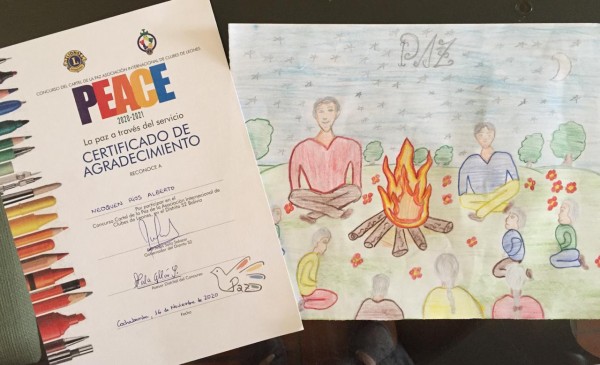
The Lion’s Club from Bolivia organized a few weeks ago the “Peace Poster” contest throughout the country, to reach out especially to boys and girls. With this contest they were interested in reaching institutionalized children, deprived of parental care, who reside in various centers, victims of violence, abandonment and street situations. One of the objectives was for these children to receive a message of peace, love and hope, generating resilience to overcome the adverse circumstances they have suffered in their lives.
The adolescents from our Casa San José participated in the contest held at the Cochabamba level for a subsequent national selection. The educators of the center helped and accompanied them to develop their artistic skills in drawing and painting, so that they could express what peace means to them.
We were pleasantly surprised when we learned that our teenagers' drawings had been selected for a showing throughout Bolivia. In this way, and with events like this, the different skills and artistic abilities of all the children and adolescents welcomed at Casa San José are reinforced, and they discover many skills that so far, perhaps due to the type of lives they experienced with their families, had not been stimulated. And, of course, they were awarded for their art and creativity. We rejoice with them!
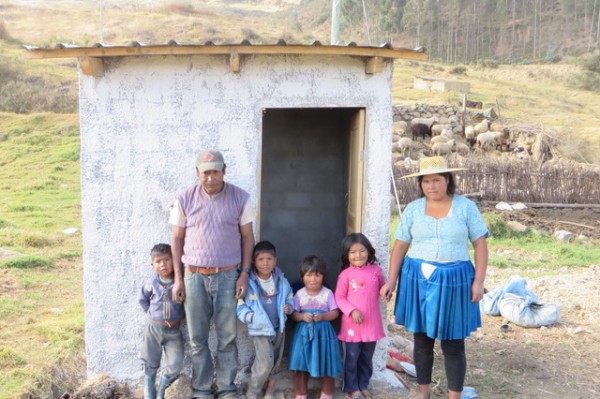
Last Lent, in the middle of the Covid-19 Pandemic, Saint Richard’s Parish led a Lenten project alongside with Saint Edward’s and Saint Patrick’s parishes in the Catholic Community in Central Racine (WI). The Lenten Campaign was “God’s Love Knows No Boundaries”. The three parishes worked together to support HALO in Racine, an organization that helps the homeless in the city of Racine and the Community of Saint Paul in Cochabamba, Bolivia. The idea was to reach out to our brothers and sisters at home and abroad. Saint Richard’s parish committed to fundraise for 20 bathrooms to help 20 families to have a full bathroom with hot shower and toilet at their homes in the rural areas of Independencia, in Cochabamba, Bolivia, project carried out by the Community of Saint Paul there. Thanks to the great generosity of everyone Saint Richard’s was able to double the goal. Now, 40 families in the Andes mountains will benefit from this great campaign. The following video is a follow up of the project. Gemma Regales, a member of the Community of Saint Paul, and project coordinator, narrates the work that has been accomplished so far. We hope you enjoy it.
https://youtu.be/VVnSev4QAeU
The children in Casa San José in Cochabamba, Bolivia, have shared this video they have prepared. They wish everyone hope and strenght in the face of the pandemic.
We hope you enjoy it!
http://www.youtube.com/watch?v=4fXetdYcH68
.jpg)
Being in a mission trip is like being in a pilgrimage of faith, but instead of visiting shrines, monuments, churches, monasteries and other sites from the past, we visit people of faith in the here and now. Recently, a group formed by parishioners from three parishes of the Archdiocese of Milwaukee flew to Bolivia with Fr. Juan Manuel Camacho, from the Community of Saint Paul.
Bolivia is the poorest country in South America. Its socio-economic reality is precarious, and there are many needs at all levels. The purpose for the “pilgrims” in Bolivia was to get to know the reality of the people that the CSP serves there. The group was able to help with the street children center in Cochabamba (Casa San José). They spent two days on educational activities with the children, who at the same time had the opportunity to interact with people from a different culture. The group also worked on the rural areas in a reforestation program planting trees on the barren mountains of Los Andes. The reforestation program that the CSP has in the mountains of Cochabamba is located in the municipality of Independencia. There, on the top of the Andean mountains, the visitors from the USA worked shoulder to shoulder with the local farmers planting trees that will make a difference in their lives. But all the work that we did was minimal if we compare it with the great work the Holy Spirit did in each one of us pilgrims. The transformation that happens when we come out of our comfort zones and open our hearts to a different reality is just amazing. We celebrated Mass in a rural community, a place where the local priest can only get to once every three months. It was a great expression of the diversity of the Church, since during the Eucharist three languages were spoken: Spanish, Quechua and English.
This mission trip was one of many efforts from the CSP to bring people of different parishes and walks of life from the archdiocese of Milwaukee to connect with the missionary life of the Church. We look at these trips as pilgrimage of faith: pilgrimages that help us understand the Church, its vitality, its critical role in so many places of the world, and its diversity.
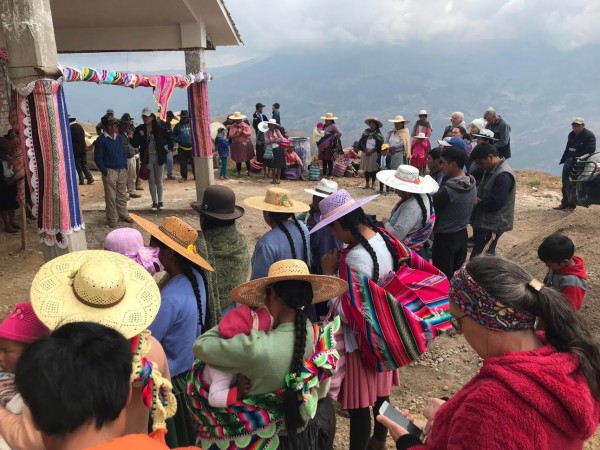
Last Saturday, August 24, took place in Totorani (Independence, Bolivia) the inauguration and blessing of a new chapel, which will also serve as a community center for the local population. The construction of this new space for prayer and community meetings was funded entirely by donations from parishioners of the Sacred Heart parish in Racine, Wisconsin, of which Ricardo Martín, a member of the Community of Saint Paul, is pastor.
The inauguration took place in a festive and celebratory atmosphere, with the presence of some fifty families from Totorani and several neighboring villages (Chulpani, Rodeo, Buenavista, Tiquirpaya). Father Teófilo, parish priest of Independence, and two other fellow priests (all of them Salesians) were also present, as were the members of the CSP living in Bolivia and Ricardo Martín, who traveled from the USA with several parishioners from Wisconsin.
The land where the new building stands is communal, and the people of the area donated it so that the community center and chapel could be built there. The construction is 23 meters long and 8 meters wide.
We congratulate all those involved in this initiative: the local communities who donated the land, the members of the CSP who coordinated the project and the parishioners of Sacred Heart in Racine who also made it possible with their generosity.
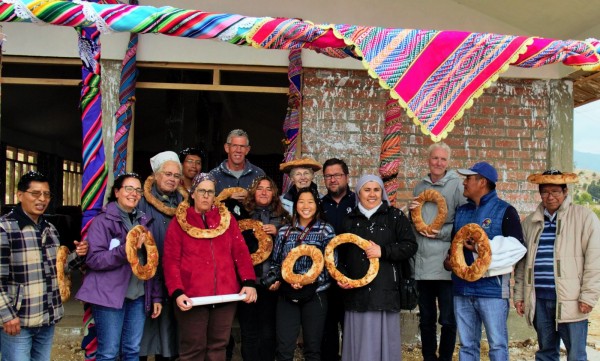
The Community of Saint Paul continues with its program of establishing latrines in Independencia, Bolivia
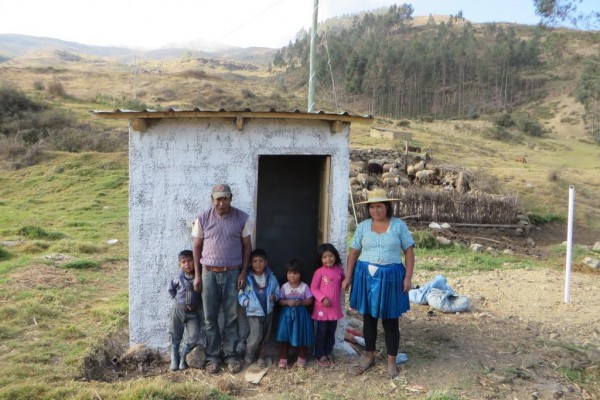
Ten months ago, we took on a new challenge in the rural area of Independencia (Cochabamba, Bolivia): the construction of simple but decent bathrooms for the families of the farming communities.
The farmers in this rural area live in houses built in a traditional way with adobe, wood and stone with thatched roofs. The residents of these communities do not have toilets or latrines, they go to the countryside to relieve themselves and have health problems, among others, due to the contamination of drinking water sources.
The bathrooms that we are starting to build are 2m x 1.5m, consist of a toilet, a shower and a tap outside the bathroom to catch the water and throw in the cup and to wash one’s hands. They are basic, but they allow families not to go outdoors to relieve themselves. We also saw the importance of the shower, since after doing interviews to the families going house by house we realized that they do not have a private space to wash and most of them bathe only once a month! We must bear in mind that we are at 3,500 meters above sea level, in a region of intense cold.
Currently 24 homes of the rural community of Totorani and 15 of Chulpani already have a decent bathroom to shower with hot water and to do their physiological needs with privacy and without polluting the environment.
Throughout the process of the implementation of the restrooms, the beneficiary families are actively participating, both in the choice of the technological option and materials, as well as in the conditions and commitments on their part. In addition, a hygiene and basic sanitation workshop has been developed with families to address issues such as health, individual and domestic hygiene, environmentally friendly practices, rational use of water and care and use of the bathroom. In this way, emphasis is placed on improving hygienic habits and ensuring the sustainability and proper use of bathrooms in homes.
The 39 families that already have their bathroom in their home are very happy and enthusiastically see the possibility that their children get sick less of diarrhea and are cleaner. They are aware that by using the bathrooms their environment improves, they have also gained in dignity and have shown that by organizing and working together everyone wins.
And we will continue with more bathrooms, because in total there are 105 families who want to have a bathroom in their home in this area.
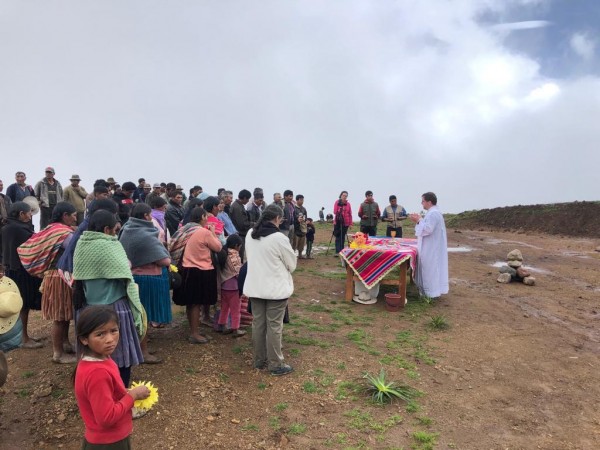
During Lent, Catholics around the world are invited to practice more deeply the observances of Lent: Prayer, fasting and almsgiving. One of the members of the Community of Saint Paul, Fr. Ricardo Martin, is the pastor at Sacred Heart Parish in Racine, Wisconsin. For the last two years, this parish has dedicated its Lenten almsgiving to building two chapels in the territory of La Sagrada Familia Parish in the Dominican Republic, where members of the CSP have worked since 2003. These chapels are not only spaces of prayer, but also serve as places for the people to gather, and from where the CSP runs several educational programs. Both years, two different groups of parishioners have traveled from Racine to the Sabana Yegua, Dominican Republic to learn about work there and to be present for the consecration and blessing of the chapels.
This year, the parish will be aiming its Lenten campaign to the building of another chapel/community center but this time in the area of Independencia, in the province of Cochabamba, in Bolivia. Independencia is four hours away from the city of Cochabamba, driving through a breathtaking section of Los Andes. The chapel will be built in a plot donated by the local community, situated in a central location to serve eight different rural communities, and it will host medical and agricultural programs. To learn about the project and the people it will serve, last February Fr. Ricardo visited the area. This is the video that was produced to explain the project to Sacred Heart parishioners: http://www.youtube.com/watch?v=ZMKc4vAvZyc
Reforestation as an alternative to climate change in the province of Cochabamba (Bolivia)
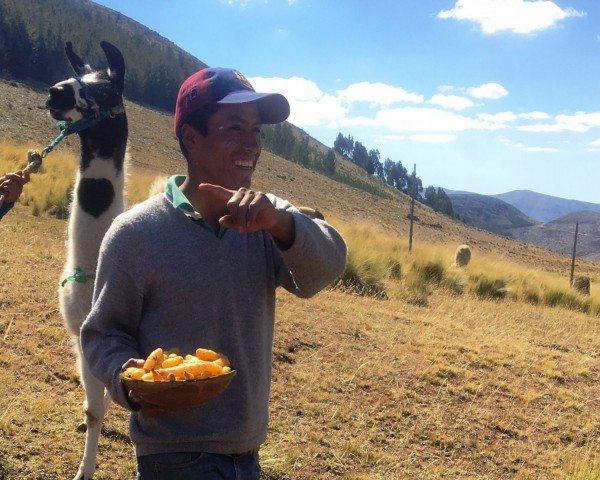
From the municipality of Vacas, in Bolivia, Aniceto Arroyo sends us the following testimony:
For 14 years, the Community of Saint Paul has been involved in different development projects in the highlands of this municipality of Vacas. One of them is the initiative of reforestation in ten rural communities. Climate change has reduced the harvest of Andean tubers typical of the area, producing a large migration of peasants to the cities, where they often become poorly paid labor.
The reforestation project in Vacas, through which one hundred hectares have been planted with more than 50,000 pine seedlings, is a long-term initiative that aims to provide wood for construction and for use in the home.
Community leaders have played a very important role in this process. Young David, for example, became involved in it since the time he was 12, and became one of its pillars. A few days ago, we were pleased to learn that the municipality of Vacas recognized the value of the project as an alternative for the future of their families. As a result, the municipality proposes to double production, including 120 families in its development. The proposal will be presented to the national government, which has resources for the environment from the European Union. In this context, the municipality has chosen young David as a technician to carry out the project during the next three years. They feel that an external person would not be involved in the same way as this young man from the community, who has a great experience of producing seedlings in the territory, 3,000 meters above sea level.
David, who has been the soul of this community work for ten years—despite not having finished high school—will be part of the positive change that continues to arrive in the area. The community is proud of its achievement and is confident that he will play a great role in carrying out the project. We hope that in a few years there will not be only one David, but many, helping the population of these areas achieve a dignified life.
Benefactors of the CSP gather in Milwaukee to support Casa San José
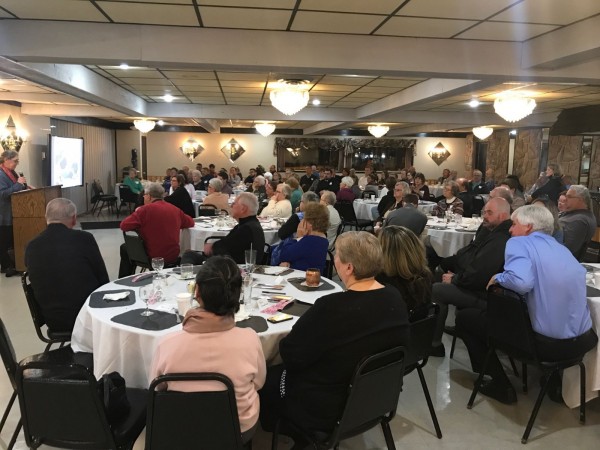
On Sunday, November 18, Fr. Leonard Barbian, a priest of the Archdiocese of Milwaukee, hosted a dinner to raise friends and funds for "Casa San José", an apostolate of the Community of Saint Paul in Cochabamba, Bolivia. "Casa San José" works to identify boys living on the streets of the city (a recent study says there are 1,800 such children, mostly boys), and bring them into the safety of the center. They receive medical care, counseling and education, while the Casa strives to find their families and works with them so that the boys can return their families and a safe home. Montserrat Madrid and Gemma Regales, members of the CSP who live and work in Cochabamba, were present at the event.
This was the third such dinner, and the largest with over 90 people attending. From here, we would like to express our gratitude for the hospitality of Carl’s Catering in Greendale and to all those who took the time to attend and hear about this important work of the Church. And a very special thank you to Fr. Leonard, who generously sponsored and hosted this event. Thanks!
A group from Milwaukee visits the CSP projects in Cochabamba, Bolivia
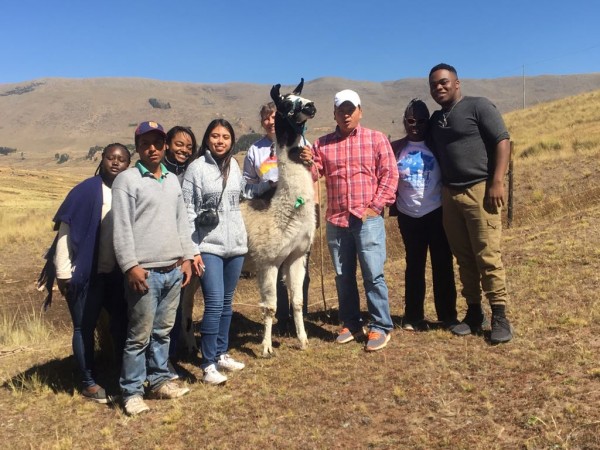
From May 22 to May 30, a group of people from various parishes in Milwaukee visited the projects that the Community of Saint Paul carries out in Cochabamba, Bolivia. The Director of the Missions Office in the Archdiocese of Milwaukee, Mrs. Antoinette Mensah, and Fr. Juan Manuel Camacho, of the CSP, coordinated the event.
The visitors were able to learn about the reality of the street children of Cochabamba and to listen to the stories of the children themselves. The program that the CSP has in Cochabamba (as it has been mentioned often in this blog) wants to prevent that children who live in the street may end up using drugs and being caught in the networks of drug distribution. From “Casa San José” (a shelter center for children) we seek to reunite children and adolescents with their families, carrying out a process of rapprochement and knowledge of each particular situation.
The group from the USA also could get a sense of how harsh and difficult it is the life of the peasants in the Andes, in the rural area of Cochabamba, located at 4,000 meters above sea level: these peasants face the rigors of nature by producing llamas, sheep, potatoes and beans, as well as pine trees to reforest their mountains. Outside the city of Cochabamba the CSP works for the integral human development of the indigenous communities of the municipality of Vacas and Independencia.
The purpose of the trip was to help its participants (mostly young people) to reflect on the missionary reality of the Church and on the different expressions of faith lived by the peoples among whom the Community of Saint Paul works. The aim was to deepen the connection of the local Church of Milwaukee with the universal reality of the Church. It was, without a doubt, a very fruitful trip.
Commemoration of the Anniversary of Casa San José in Bolivia
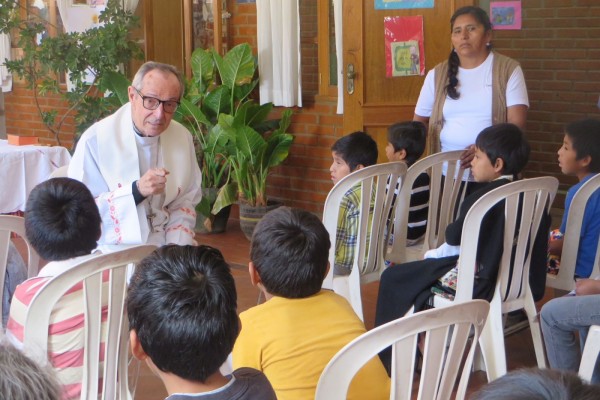
May 1, the feast of St. Joseph the Worker, is a very special day for Casa San José in Cochabamba, Bolivia: it marks our anniversary. Fourteen years ago, we opened our doors to shelter children and teenagers in vulnerable situations, especially those on the streets, so that they might live in a dignified manner. While the youth are living at Casa San José, we work with their relatives, so that reintegration of the children into their families can be successful and they will not return to the streets.
In Bolivia, there are close to 2,200 children and adolescents living in the street, more than 1,000 living in prison with their parents (who are completing penal sentences) and hundreds more who are victims of sexual violence, slavery and trafficking.
On May 1, to commemorate the 14th anniversary of the opening of Casa San José, Msgr. Tito Solari, Archbishop Emeritus of Cochabamba, joined us and celebrated the Eucharist with the 24 children and adolescents who are currently at Casa San José. It was a very beautiful, warm and joyful celebration. Bishop Solari repeated several times to the children that what God likes most about them is that the children are always smiling and happy. “Be smiling children, bearers of light, so that you may always illuminate the world. God holds you in his heart and he loves you very much,” he told them.
The Difficulties of Higher Education Faced by Rural Women in Bolivia
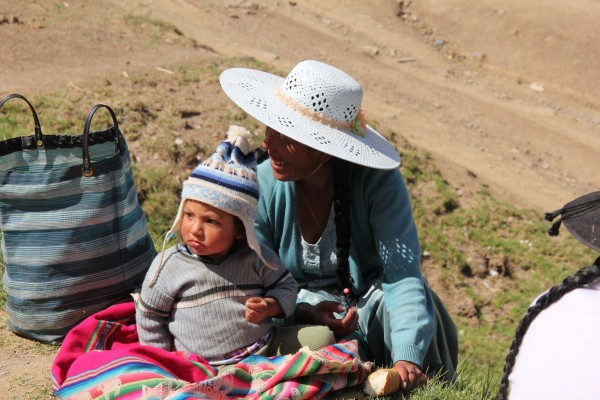
The scene repeats itself again and again: the father saying to his daughter, “Why do you need to continue studying if you already know how to read and write? That is enough to be a good wife. That's how it was for your mother, and you see her...proud of her five children.”
The daughter realizes that there is no real communication taking place. How can she convey to his dad the eagerness in her heart, this passion to continue her studies? If, after all, the friend who finished high school with her is already married and expecting a baby? Besides...studying agricultural science? A woman? Someone filled up your head with nonsense…
And so the story repeats itself. In Bolivia, the Community of St. Paul is promoting the development of rural women, trying to break some of the age old taboos. In Totora Pampa, where the Community carries out several development projects, little by little, youth are finishing high school, and some are encouraged and daring enough to undertake university studies.
There is no point in blaming the parents, who are in need of hands to help the family. It’s hard for them to imagine a future different from the one they had, in which they could not study. The adventure of going to a university is almost unheard of in their communities, let alone for women. “From time to time, a young man will leave and be successful, but not you, my daughter,” a father would say to his daughter, doubting her ability and fearing the difficulties and risks that she might encounter on her road to becoming a professional.
That’s how it was going to be for Martha, a women among many, who nonetheless was able to change the course of her future. She studies agriculture in a boarding school, far from her home. Martha was clear about her future and had planned, upon finishing technical school, that she wanted to continue her studies and earn an engineering degree. The process is slow and costly, and her environment is not exactly supportive of her dream. We, at the Community of St. Paul, do support women like Martha and hope that many more like her will obtain the professional formation that they are seeking. In that way, the story, the same old movie of resignation and lack of higher education for women of Bolivian communities, doesn’t have to repeat itself indefinitely.
The Community of Saint Paul Accompanies and Guides an Association of Women Weavers in the Altiplano of Cochabamba
The Association of Women Weavers of Totora Pampa has been in existence for three years already. It was formed with the idea of creating a space for training illiterate peasant women; the association began with fifteen members and currently has sixty-five. There, the women learn to weave and make warm clothing, especially for the children of their families. The families live at more than 3,400 meters above sea level, and the cold there is intense. At the same time, the association is also a privileged meeting place where women share worries and learn to listen to one another. The topics of their conversations are varied: domestic violence, the economy of rural communities, the effects of climate change, food security, migration from the country to the city and gender inequality. The women would not use these terms to describe the subject of their discussions, but they do cover these topics. In simple terms, they chat about machismo, early pregnancies, married youth, the abandonment of single mothers and other topics that worry them and directly impact the conditions in which they live.
The team of Community of Saint Paul that works with the women of Totora Pampa uses the topics that surface in these meetings to then prepare formal talks, through which they support the women, analyze the situations and seek alternatives to alleviate the region’s problems. The women take the first step, offering each other mutually support. Then, the team helps by offering the talks.
We are convinced that giving support to these peasant women is the best guarantee we can offer to help the development of their communities.
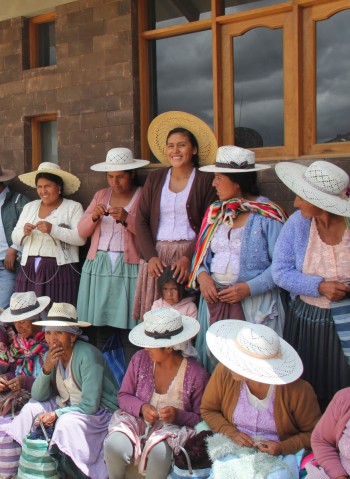
In “Casa San José” of Cochabamba, the Community of Saint Paul Combines Family Reintegration with Schooling for the Children
.jpg)
The goal of la “Casa San José” is the reintegration of children who are living on the streets back into their family homes. There, we have a conflict of priorities, and have recently tried to find a solution.
When the children arrive at the center, a period of intensive work begins. During this time, the psychologist, the social worker and the educators focus on all of the psychological and emotional aspects of the children, as well as their habits, behavior and discipline. This is done through several workshops, with the goal of achieving the child’s reintegration into his family. During this time children do not attend school. That is why we try to keep children at the center only for the time that is absolutely necessary. In fact, the law recognizes the importance of such a period, and the courts do not authorize formal schooling for the children during this time.
The problem begins when the children are ready to return to their families: the family’s suitability has been assessed, the parents have attended parenting classes at the center, but then, due to bureaucratic delays, the legal process takes several months —and during this time the kids cannot return home yet, and they cannot attend school either. And as the saying goes, “Justice delayed is justice denied.”
This situation worries us. Even though our top priority is to restore the family unit, it is a shame not to be able to integrate the children back into school sooner. After thinking much about this and meeting with parents, we found a solution. The families agreed to enroll their children in the schools of their respective neighborhoods, pick up their children at “Casa San José” daily, bring them to school and return them to our center in the afternoon. Even though it represents a major effort on their part, they understood that it was worthwhile to do this, so that the children would not miss a school year. In this way, we’ve been able to bring together family and school, without having to choose one or another.
The Archbishop Emeritus of Cochabamba, with a life of service to the Gospel, receives a well-deserved recognition
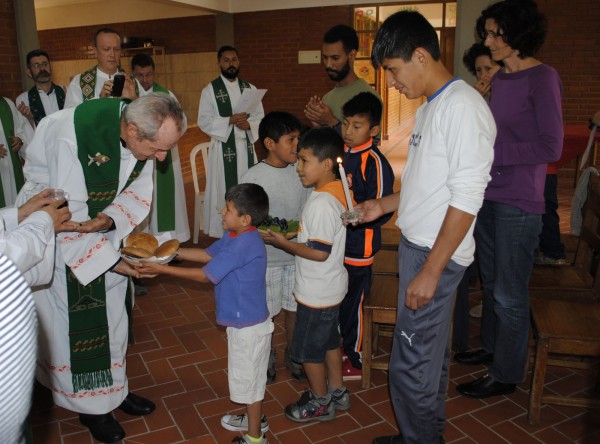
On the occasion of Father's Day, Msgr. Tito Solari, Archbishop Emeritus of Cochabamba, was recognized by the people of the city, who wanted to express their gratitude to him for his work of more than forty years in favor of Bolivia’s most vulnerable men, women and children.
In the celebration to honor Msgr. Solari, the mayor of Cochabamba, Mr. José María Leyes, described the former archbishop as the “spiritual father of Cochabamba”: “Monsignor Tito has been a father, because he has learned to teach his flock. He has also been a father during hard times in the recent history of our city”, he said.
At the commemorative event, the Emeritus Archbishop, a native of Italy, said: “There is something that has been difficult for me to recognize; when it was my turn to leave my parish, I felt like my heart was breaking: there I understood that this was the feeling that a father has for his child”.
Archbishop Solari promoted multiple apostolic and social initiatives during his years as pastor of the Archdiocese of Cochabamba. Among them, the homes for street children and teenagers, such as Casa San José, founded in 2004 by the Community of Saint Paul at the request of the archbishop. Street children have always been one of Msgr. Tito's greatest concerns.
A new initiative to help farming families in Bolivia

As many of the readers of this blog already know, the Community of Saint Paul runs development projects in eight rural communities from the Totora Pampa region, near Cochabamba, in Bolivia. We have implemented a reforestation project, since the zone is very arid and the subsoil is deteriorating slowly with the subsequent loss of nutrients that affects the crops. Each year we have planted fifty thousand trees on the communal lands of the area. A while ago we began a new initiative that, so far, is progressing very well. In one of the controls of the reforested zones we realized that under the pines grew mushrooms: no one collected or paid any attention to them.
Then we decided to take advantage of a resource that was born naturally and without generating any cost. The process through which the local population learned to value the mushrooms was long: we had to demonstrate that this product is not harmful to our health, and that it can be consumed in different ways. Then they had to learn how to preserve the mushrooms in times when the lack of rain no longer allows for their production.
Once the mushrooms began to be an element —although still sporadic— in the local diet, we continued with the following phases of the project. First, people learned how to produce and harvest them properly; next, they learned the mushrooms’ dehydration process.
We delimited the grazing areas, to preserve the areas of mushroom production and thus prevent the llamas, sheep and cows from damaging the crop. We have also regulated the collection to avoid overexploitation and favor the production of the following seasons.
Along the process, theoretical and practical workshops have served us all to learn the physiology of mushrooms and their relationship with the environment. To dehydrate them, we constructed domestic dryers with plastic and local wood near the family houses, so we can protect them from rain and keep the necessary humidity, about 5%, to guarantee the quality of the final product.
As a result of all this work, the people of the Totora Pampa now see the production of mushrooms as an economic and nutritional alternative.
The last aspect of the project has been a surprise even for us: we discussed this initiative with the owners of a few restaurants in Cochabamba… and they were interested! We started a simple marketing of the product, and now four restaurants from the city have become our loyal customers! Currently, the chefs of these restaurants prepare their pizzas of fungi porcini, risottos and different types of pasta, all with our mushrooms! They are the pride of the inhabitants of the humble community of Totora Pampa, who farm the —now increasingly renowned— mushrooms.
A van for 23 students allows young men and women from Totora Pampa (Bolivia) to study without impediments
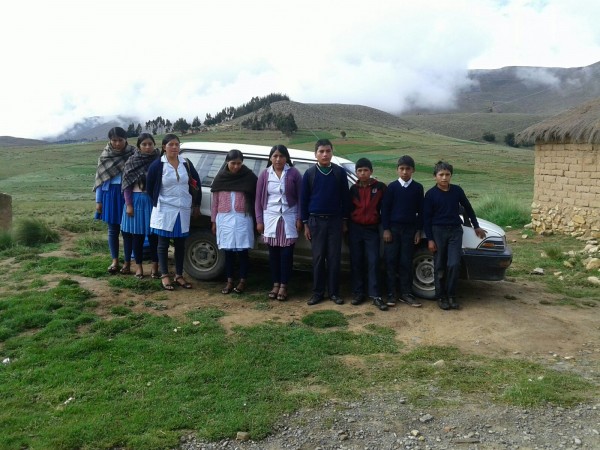
The journey of some students from Totora Pampa —in the high lands of Cochabamba— to their school is now much shorter: until recently, they had to walk two hours from their homes to their classrooms, and now they reach their destination in less than 30 minutes! For these students, the only chance to go to secondary school was by undergoing a tiring and dangerous walk, (especially for the girls), six miles each way, at an altitude of more than 10,000 feet. In such a climate, even a simple cold would make the walk of these youth to their school very hard.
To face this problem, we talked with those living in that rural area about the possibility of hiring a van to cover that journey, and finally the dream came true. A vehicle was hired to help with the transportation of 30 students, each family being responsible for a portion of its service’s cost. Thanks to the van, now the students arrive on time, safely and comfortably to the school. They also can save plenty of time to dedicate it to study and other domestic chores, which are always important in families where each hand counts. The say, happily… “Let’s go to school… but by car, please!”
The Women’s Association of Totora Pampa initiates a program to help illiterate people
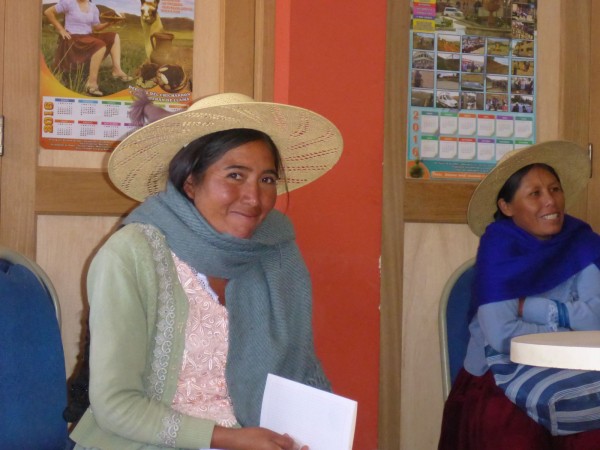
In many rural areas of Bolivia there are adult women who, in spite of the educational improvements of the last decade, remain illiterate. They never had the opportunity to study: there weren’t schools near their towns, or their parents decided that women didn’t need to prepare themselves academically.
A while ago the Association of Women in the area of Totora Pampa informed us of the necessity and desire of many women to study. When they go to the cities to sell potatoes, llamas, sheep, pigs and chickens, they suffer because they don’t know how to read: for those who are illiterate, something as simple as locating an address becomes a problem. Furthermore, in order to obtain identification documents, birth and marriage certificates, school records and bills of sale, it is necessary to be able to read. Otherwise, they can easily be the victims of errors, deceptions or shams.
In response to this problem, José, an agricultural engineer, and Lourdes, an accountant, have started literacy classes for adults. José and Lourdes are a married couple who, in conjunction with the Community of St. Paul, are involved in several agricultural projects and reforestation of the area. Each afternoon they dedicate two hours to teaching literacy to 16 women between the ages of 22 and 72. The gathering finishes by sharing coffee and bread. We hope that there are many more who wish to learn to read and write in order to do business, build their self-esteem and achieve so many goals for which literacy is needed!
To spend years in one place, sharing experiences with its people and accompanying them in their personal processes, has its rewards. Deysi Rosa, for instance, is a great gift for us. We met her when she was barely three years old, and we had just arrived at the Totora Pampa Community in Cochabamba, Bolivia. Deysi, the second of five sisters, was always shy, responsible, hard working and endowed with a great interior strength. However, the family environment where she was growing up didn’t forecast success. Her older sister, at age 20, was already raising two children. Her younger sister didn’t want to study because her plans were, as she put it, “to find a husband while I am still young”.
Deysi, however, had this vague “something” that some people possess, which makes you think that they can really improve their odds, that they won’t accept for themselves a somber future. For years we saw the determination and will that Deysi put into her studies in spite of the fact that the majority of her classmates were abandoning the classroom and starting families.
When we asked her what she wanted in life, she would adopted a firm posture, in spite of her shyness, and would tell us that she would like to achieve more than just work the land and have children. She wanted to study and learn about other places. Her plan, though simple in appearance, was a great challenge: in order to achieve it, she needed to break cultural habits and overcome many economic barriers. The distance between Totora Pampa, in the mountains, and the big city of Cochambamba (where she would study) was not just geographic, but also economic and social.
Seeing her situation, and that of several girls from the same area that had approached our community, we decided to provide scholarships to six young women to study nursing at an institution for women from rural areas. The advantage of this institution is that it provides the students with a place to study, materials, food, schedules and living accommodations. The young people from rural areas can, in this way, overcome the previously mentioned obstacles and barriers and complete their professional formation in the best possible environment.
Today, Deysi is a full time student, and tells us how she takes full advantage of her time, because she knows that this opportunity is a gift. We, however, think that she is the gift. Her interior strength has opened a previously closed door, so that in the future other women from Totora Pampa may follow her footsteps.








.jpg)










.jpg)



